
Home


Hungary


Cardinal József Mindszenty


1956 Hungarian Revolution (My Story)
(My Eyewitness story of our Freedomfight
and Resistance against the Soviet Invasion)


50th Anniversary of our Freedomfight


My Travel Pages

Africa

America

Asia

Europe

Hungary

Oceania
My Russia pages

Russia
Russia History & Facts in brief
Moscow

Moscow

Catholic Cathedral

Christ the Saviour Cathedral

Kazan Cathedral

Kremlin

Kremlin Cathedrals

Moscow Airport

Moscow Buses

Moscow Metros

Novodevichy Convent

Red Square

Virgin on the Moat Cathedral
- - -
- -
Saint Petersburg

Saint Petersburg

Artillery Museum

Hermitage

Kronstadt

Peterhof

Oranienbaum

Peter and Paul Fortress

Saint Petersburg Airport

Saint Petersburg Buses

Saint Petersburg Metros

Saint Petersburg Trams

Vyborg
- - -
- -
Vladivostok

Vladivostok

Vladivostok Buses

Vladivostok Trains

Vladivostok Trams
- - -
- -
Volgograd

Volgograd

Tractor Factory - Museum

Volgograd Airport

Volgograd Buses

Volgograd Trams

Volgograd Trolleybuses
|

Russia facts & history in brief
 My Russia pages directory
My Russia pages directory
Map of Russia
Volgograd International Airport
Excerpted from Wikipedia, the free encyclopedia
|
Volgograd International Airport |
|
|
| IATA: VOG - ICAO: URWW |
| Summary |
| Airport type |
public |
| Operator |
JSC "Volgograd International Airport" |
| Serves |
Volgograd |
| Elevation AMSL |
482 ft (147 m) |
| Coordinates |
48°46'54?N, 044°20'48?E |
|
Runways |
| Direction |
Length |
Surface |
| ft |
m |
| 11/29 |
8,202 |
2,500 |
Asphalt |
Volgograd International Airport is an airport in Russia
located 15 km northwest of Volgograd.
It comprises a civilian airport built on top of an
older military runway (3300 m), now demolished.
The terminal area parks 42 medium/large
aircraft and 91 small aircraft.
A military training unit was present at Gumrak as
late as 1994, the 706 UAP (706th Aviation Training
Regiment), using Aero L-39 aircraft.
Airlines and destinations
- Aeroflot (Moscow-Sheremetyevo)
- Aeroflot-Nord (Moscow-Sheremetyevo)
- Kogalymavia (Surgut)
- S7 Airlines (Moscow-Domodedovo)
- Rossiya (Saint Petersburg)
- Volga-Aviaexpress (Aktau, Moscow-Domodedovo, Yerevan)
- Vyborg (St. Petersburg)

For a more information about
Volgograd Airport see Wikipedia, the free encyclopedia

This page was retrieved and condensed from
(http://en.wikipedia.org/wiki/Volgograd_Airport)
see Wikipedia, the free encyclopedia, January 2008.
All text is available under the terms of the
GNU Free Documentation License
(see
Copyrights for details).
About Wikipedia
Disclaimers

This information was correct in January 2008. E. & O.E.

2007
You can click on these photos for an enlargement
 |
 |
 |
| Volgograd Airport |
Volgograd Airport |
Volgograd Airport |
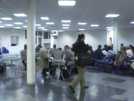 |
 |
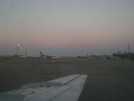 |
| Volgograd Airport |
Volgograd Airport |
Volgograd Airport |
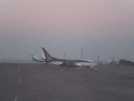 |
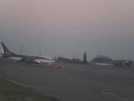 |
| Volgograd Airport |
Volgograd Airport |

Volgograd
Excerpted from Wikipedia, the free encyclopedia
|
Volgograd (English) |
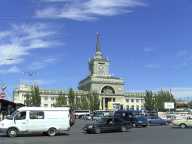
Volgograd train station |
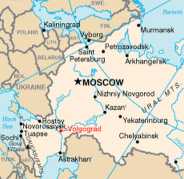
Volgograd on the map of European Russia |
Coordinates
48°42'N 44°31'E 44.517 |
| Coat of Arms |
Flag |
 |
 |
| City Day - Second Sunday of September |
| Administrative status |
Federal subject
In jurisdiction of
Administrative center of |
Volgograd Oblast
Volgograd Oblast
Volgograd Oblast |
|
Local self-government |
| Charter |
Charter of the Hero City Volgograd |
| Municipal status |
Urban okrug |
| Head |
Roman Grebennikov (2008) |
| Legislative body |
City Duma |
| Area |
| Area |
565 km² (218.1 sq mi) |
|
Population (as of the 2002 Census) |
Population
- Rank
- Density
|
1,011,417 inhabitants
12th
1,790.1/km² (4,636.3/sq mi) |
| Events |
| Founded |
1555 |
| Town status |
1780 |
| Renamed Stalingrad |
1925 |
| Renamed Volgograd |
1961 |
|
Other information |
| Postal code |
400001..400138 |
| Dialling code |
+7 8442 |
|
Official website |
| http://www.volgadmin.ru |
Volgograd, formerly called Tsaritsyn (1598-1925) and Stalingrad
(1925-1961) is a city and the administrative center of
Volgograd Oblast, Russia.
It is 80 kilometres long, and situated on
the west bank of the Volga River.
History
Volgograd originated with the foundation in 1589 of the
fortress of Tsaritsyn at the confluence
of the Tsaritsa and Volga Rivers.
The fortress, which took its name from the local name
Sary Su (Yellow Water/River in the Tatar language),
was established to defend the unstable southern border
of Tsarist Russia and became the
nucleus of a trading settlement.
It was captured twice by Cossack rebels, under Stenka
Razin in the rebellion of 1670 and Yemelyan Pugachev in 1774.
Tsaritsyn became an important river port
and commercial centre in the 19th century.
The city was the scene of heavy fighting
during the Russian Civil War.
Bolshevik forces occupied it during 1918, but were
attacked by White forces under Anton Ivanovich Denikin.
During the battle for Tsaritsyn the Bolsheviks were pushed
back and surrounded at first, and only the actions of Josef
Dzhugashvili (nicknamed 'Stalin'), then local chairman of the
military committee, saved the city for the Bolsheviks.
Stalin did so by recalling Zhloba's 'Steel Division' from
the Caucasus which attacked the White Forces in the rear.
In honor of Stalin's efforts in defending the city, it was
renamed Stalingrad (literally: "Stalin city") in 1925.
The name change is typical of the way towns and cities were
re-named after Bolshevik leaders and heroes during Soviet times.
Under Stalin, the city became heavily industrialized and
was developed as a centre of heavy industry and
trans-shipment by rail and river.
During World War II (Great Patriotic War), the city of
Stalingrad became the center of the Battle of Stalingrad as well
as the pivotal turning point in the war against Germany.
The battle lasted from August 19, 1942 to February 2, 1943.
In terms of loss of human life, 1.7 million to 2 million Axis
and Soviet soldiers were either killed, wounded or captured,
as well as over 50,000 civilians killed.
The city was reduced to rubble during the fierce fighting,
but reconstruction began soon after
the Germans were expelled from the city.
For the heroism shown during the battle, Stalingrad was
awarded the title Hero City in 1945, and King George VI
of the United Kingdom awarded the citizens of Stalingrad
a jewelled sword in appreciation of
the bravery that they had shown.
A memorial complex commemorating the battle, dominated
by an immense allegorical sculpture of Mother Russia,
was erected on the Mamayev Kurgan, a hill that saw some
of the most intense fighting during the battle.
A number of cities around the world (especially ones that
had suffered particularly badly during the war) established
sister/friendship links (see list below).
It was also the world's first 'twin city' when it formed a
twinning relationship with the English city of Coventry
during World War II (as both suffered heavy bombing).
The Panorama museum, which is located alongside the Volga river,
contains artefacts from World War II.
These include a panoramic painting of the battlefield from
the location of the monument "Mamayev Kurgan."
Here a rifle of the famous sniper Vasily Zaytsev, who was
featured in the film Enemy at the Gates, can also be found.
In 1961, the city's name was changed to Volgograd ("Volga City")
as part of Nikita Khrushchev's programme of de-Stalinisation.
This was and remains somewhat contentious, given the fame of
the name Stalingrad, and there were once serious proposals to change
the name back during Konstantin
Chernenko's brief administration in 1985.
There is still a strong degree of local support for a reversion
and proposals have been made from time to time, though as
yet none have been accepted by the Russian government.
Economy
Modern Volgograd is still an important industrial city.
Its industries include shipbuilding, oil refining, steel
and aluminium production, manufacture of machinery and
vehicles, and chemical production.
A large hydroelectric power plant stands a
short distance to the north of Volgograd.
Transport
European route E40, the longest European route connecting
Calais, France with Ridder,
Kazakhstan, passes through Volgograd.
Volgograd's public transport system includes a light
rail service known as the Volgograd metrotram.
Education
Educational institutions include Volgograd State
University, Volgograd State Technical University
(former Volgograd Polytechnical University), Volgograd
State Medical University, Volgograd Academy of State
Service, Volgograd Academy of Industry, and
Volgograd State Pedagogical University.

For a more information about
Volgograd see Wikipedia, the free encyclopedia

This page was retrieved and condensed from
(http://en.wikipedia.org/wiki/Volgograd)
see Wikipedia, the free encyclopedia, January 2008.
All text is available under the terms of the
GNU Free Documentation License
(see
Copyrights for details).
About Wikipedia
Disclaimers

This information was correct in January 2008. E. & O.E.
|